Related Research Articles

Year 1236 (MCCXXXVI) was a leap year starting on Tuesday of the Julian calendar.

Philip III, called the Bold, was King of France from 1270 until his death in 1285. His father, Louis IX, died in Tunis during the Eighth Crusade. Philip, who was accompanying him, returned to France and was anointed king at Reims in 1271.

Matthew Paris, also known as Matthew of Paris, was an English Benedictine monk, chronicler, artist in illuminated manuscripts, and cartographer who was based at St Albans Abbey in Hertfordshire. He authored a number of historical works, many of which he scribed and illuminated himself, typically in drawings partly coloured with watercolour washes, sometimes called "tinted drawings". Some were written in Latin, others in Anglo-Norman or French verse. He is sometimes confused with the nonexistent Matthew of Westminster.
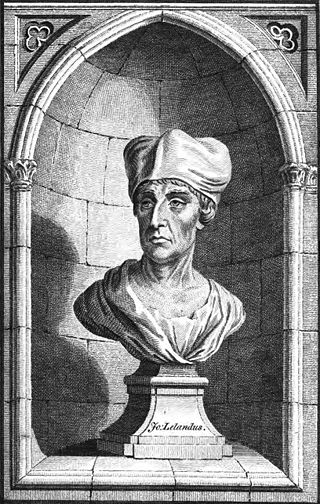
John Leland or Leyland was an English poet and antiquary.
Thomas Walsingham was an English chronicler, and is the source of much of the knowledge of the reigns of Richard II, Henry IV, Henry V and the latter reign of Edward III depicting the decline of the state of affairs of the English. He also documented the careers of John Wycliff and Wat Tyler.
Peter of Blois was a French cleric, theologian, poet and diplomat. He is particularly noted for his corpus of Latin letters.
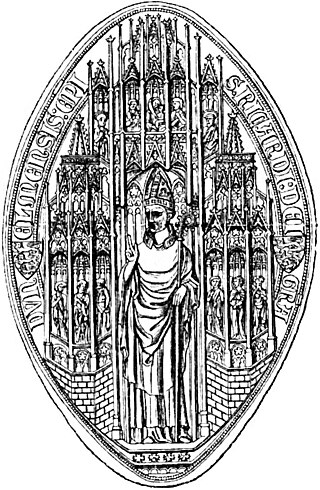
Richard de Bury, also known as Richard Aungerville or Aungervyle, was an English priest, teacher, bishop, writer, and bibliophile. He was a patron of learning and one of the first English collectors of books. He is chiefly remembered for his Philobiblon, written to inculcate in the clergy the pursuit of learning and the love of books. The Philobiblon is considered one of the earliest books to discuss librarianship in-depth.

Theobald II was King of Navarre and also, as Theobald V, Count of Champagne and Brie, from 1253 until his death. He was the son and successor of Theobald I and the second Navarrese monarch of the House of Blois. After he died childless, the throne of Navarre passed to his younger brother, Henry I.
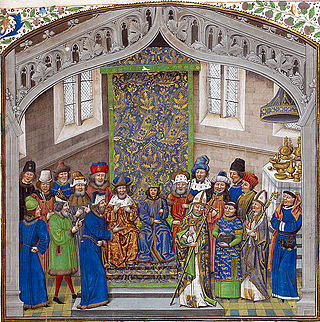
Jean de Waurin or Wavrin was a medieval French chronicler and compiler, also a soldier and politician. He belonged to a noble family of Artois, and witnessed the Battle of Agincourt from the French side, but later fought on the Anglo-Burgundian side in the later stages of the Hundred Years' War. As a historian, he put together the first chronicle intended as a complete history of England, very extensive but largely undigested and uncritical. Written in French, in its second version it extends from 688 to 1471, though the added later period covering the Wars of the Roses shows a strong bias towards Burgundy's Yorkist allies. Strictly his subject is Great Britain, but essentially only England is covered, with a good deal on French and Burgundian events as well.
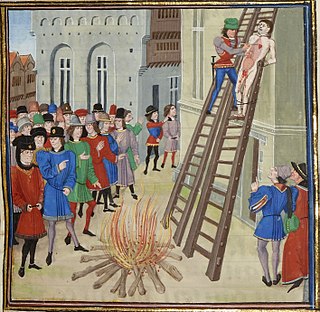
Froissart's Chronicles are a prose history of the Hundred Years' War written in the 14th century by Jean Froissart. The Chronicles open with the events leading up to the deposition of Edward II in 1327, and cover the period up to 1400, recounting events in western Europe, mainly in England, France, Scotland, the Low Countries and the Iberian Peninsula, although at times also mentioning other countries and regions such as Italy, Germany, Ireland, the Balkans, Cyprus, Turkey and North Africa.
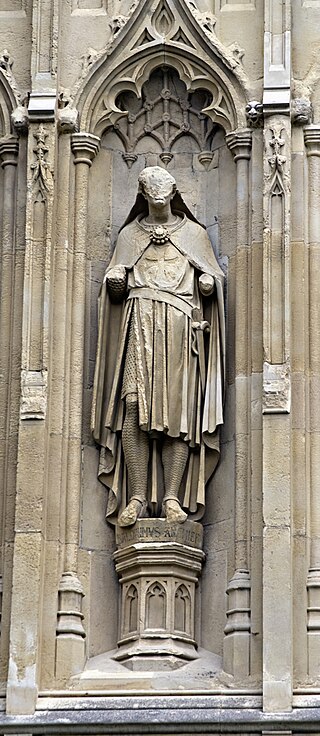
Baldwin of Forde or Ford was Archbishop of Canterbury between 1185 and 1190. The son of a clergyman, he studied canon law and theology at Bologna and was tutor to Pope Eugene III's nephew before returning to England to serve successive bishops of Exeter. After becoming a Cistercian monk he was named abbot of his monastery at Forde and subsequently elected to the episcopate at Worcester. Before becoming a bishop, he wrote theological works and sermons, some of which have survived.

Hugh Candidus was a monk of the Benedictine monastery at Peterborough, who wrote a Medieval Latin account of its history, from its foundation as Medeshamstede in the mid 7th century up to the mid 12th century.
John of Eversden or Everisden,, was an English chronicler.

John of Wallingford was a Benedictine monk at the Abbey of St Albans, who served as the abbey's infirmarer at some time between c.1246-7 and his death in 1258. He is now mostly known through a manuscript containing a miscellaneous collection of material, mostly written up by Wallingford from various works by his contemporary at the abbey Matthew Paris, which survives as British Library Cotton MS Julius D VII. This manuscript includes the so-called Chronica Joannis Wallingford or Chronicle of John of Wallingford.
William Beckley was an English Carmelite.

The Abbey of Saint-Père-en-Vallée was a monastery just outside Chartres in France. Founded by Queen Balthild in the seventh century, it adopted the Benedictine rule in 954 and joined the Congregation of Saint-Maur in 1650. It was closed with all other monasteries during the French Revolution in 1790. Today, its buildings lie within the city of Chartres and are classified as a historical monument. The church, Église Saint-Pierre de Chartres, continues to serve as a parish church.
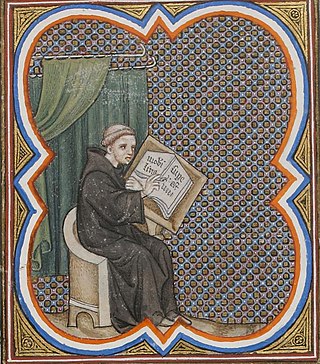
Primat was a French Benedictine monk and historian of the abbey of Saint-Denis near Paris. He composed two histories of France with a royal focus, one in Latin and the other in Old French. His Latin chronicle covers the years 1248 to 1277 but now survives only in an Old French translation and in excerpts incorporated into the works of others. It contains a detailed account of the reign of Louis IX, making it one of the most important contemporary sources for that reign. His French chronicle, the Roman des rois, covers the entire history of France down to 1223. It was completed around 1274 for Philip III and its presentation copy is extant. It is the earliest version of what would become the Grandes Chroniques de France, the first official history of France.
William (c.1177–1234) was a Benedictine monk and historian from the Kingdom of France. He served from 1207 as the proctor for his abbey in its legal battles and then from 1211 as the abbot of the abbey of Saint Sauveur et Sainte Rotrude d'Andres, a position he held until his death. Beginning in the 1220s, he wrote a long chronicle of his abbey, the Chronicon Andrense.
John of St. Giles was an English Dominican friar and physician.
Roger Dymock or Dymoke was an English theologian. He graduated D.D. at Oxford. He was probably a Dominican friar, or possibly a monk. He was the author of an unpublished treatise against Lollardy, entitled Adversus duodecim errores et hæreses Lollardorum.
References
![]() This article incorporates text from a publication now in the public domain : "Ickham, Peter of". Dictionary of National Biography . London: Smith, Elder & Co. 1885–1900.
This article incorporates text from a publication now in the public domain : "Ickham, Peter of". Dictionary of National Biography . London: Smith, Elder & Co. 1885–1900.